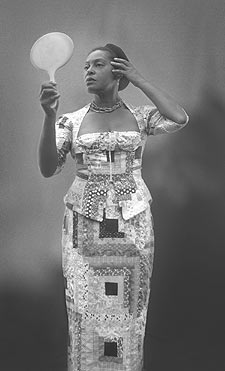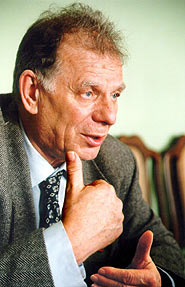Berkeleyan
Regents' Lecturership brings array of luminaries to campus
![]()
| 02 March 2005
Under the University of California's prestigious annual Regents' Lectureship program, each UC campus invites distinguished individuals from outside of academia - from the arts, letters, science, government, and business - to interact with students and faculty during a campus residency and to share their perspectives in a public lecture.
The list of past Regents' Lecturers at Berkeley includes a Who's Who of luminaries - from musician Wynton Marsalis to Nobel-Prize-winning physicist Leo Esaki and aerospace executive George Mueller (sometimes called the "father of the Space Shuttle"), to name a few. Those set to visit campus this semester are no less distinguished. The spring 2005 Regents' Lecturers (and their sponsoring departments) are detailed below, in order of their public lecture dates; all of the talks are free and open to the public.
 Carrie Mae Weems in her self-portrait, "I looked and looked and failed to see what so terrified you," from her multimedia installation The Lousiana Project |
Art Practice
Thursday, March 10
Many on campus were first introduced to Carrie Mae Weems in 1998, when the Berkeley Art Museum featured her installation "Ritual and Revolution" (first created for the DAK'ART 98 biennial, in Dakar, Senegal) as part of its Matrix series. In March the renowned photographer and multimedia artist returns to campus to discuss her role as a social observer and cultural arbiter in a lecture titled "Standing on the Outside Looking In: A Visual Presentation of Recent Works," at 5 p.m. in 155 Dwinelle.
Weems earned her early reputation for her work as a photographer, then began to use her mastery of that medium in ambitious multimedia installations, like the 32-piece installation "From Here I Saw What Happened and I Cried," commissioned by the J. Paul Getty Museum, which the St. Louis Post-Dispatch recently called "one of the masterpieces of our time." The process of creating "Families Pictures and Stories" - following her family's migration from Mississippi to Oregon through photos, audiotaped narratives, and first-person text comments - stimulated her interest in storytelling, which she went on to study at Berkeley from 1984 to 1987 with Professor Alan Dundes.
Weems' work has been exhibited in solo and group exhibitions throughout the United States and Europe, as well as in South Africa, Japan, and Korea. During her campus residency, she will attend classes taught by art practice faculty Michelle Lopez and Anne Walsh, and will visit graduate-student art studios at Richmond Field Station to talk with students and offer critiques.
 Urban designer Thomas Sieverts |
Landscape Architecture & Environmental Planning
Friday, March 11
An environmental planner and urban designer of international acclaim, Thomas Sieverts will offer the March 11 keynote address at the Metropolitan Landscape Conference. Sieverts speaks at 9:10 a.m. on "Cities Without Cities?" in 112 Wurster, and again at the conference closing event, from 6 to 6:30 p.m., Saturday, March 12, in Morrison Library.
Trained as an architect and urban designer in Stuttgart, Liverpool, and Berlin, Sieverts has been in private practice since 1965. He was instrumental in the creation of Emscher Park - a large-scale conversion of former industrial sites, steel mills, and coal mines into a regional park and cultural facility in Germany's Ruhr district. Sieverts is also known for his 1997 book Zwischenstadt - on the evolution of once-compact cities into diffuse webs of development clusters and all that means for society - and its 2003 English translation, Cities Without Cities (Rutledge). Throughout his career, Sieverts has combined research with creative work and practice.
 Physics Nobelist Zhores Alferov |
Electrical Engineering and Computer Sciences
Friday, April 8
The winer of the 2000 Nobel Prize for Physics, Zhores Alferov will speak on "Semiconductor Heterostructures: The Concept and History of Research." His talk, at 4 p.m. in Sibley Auditorium of the Bechtel Engineering Center, will be followed by a reception in the lobby of the Hearst Memorial Mining Building.
Professor Connie Chang-Hasnain, Alferov's Berkeley host, calls him "a true pioneer in the fields of semiconductor materials and optoelectronic devices. His seminal work on heterojunction lasers and compound semiconductor materials," she says, "opened the door for a tremendous amount of research and development work worldwide - all of which has directly and indirectly led to the information revolution we experience today."
A large number of optoelectronic devices - such as semiconductor lasers, light-emitting diodes (LEDs), solar cells, transistors, and photodetectors - all bear the marks of Alferov's research. Over the past decade, the Ioffe Institute in St. Petersburg, Russia (of which Alferov is director) has made major contributions concerning nanostructured materials, a subject of intense interest to many researchers on the Berkeley campus.

